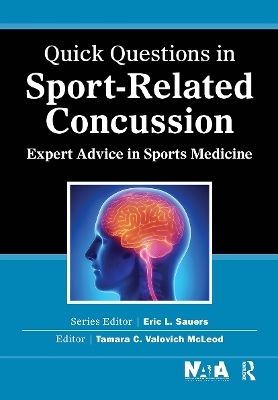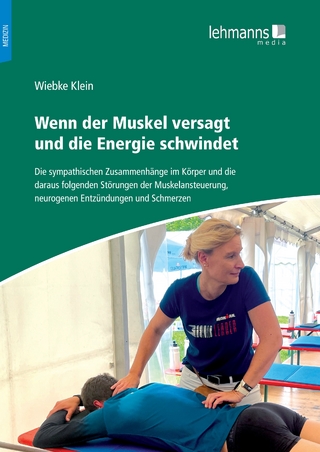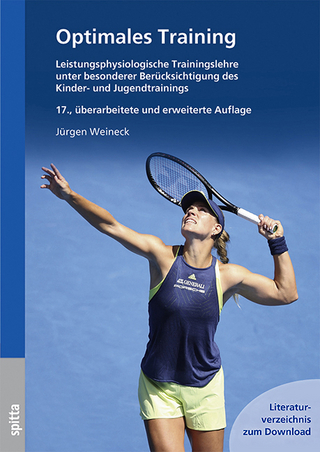
Quick Questions in Sport-Related Concussion
Routledge (Verlag)
978-1-032-96733-2 (ISBN)
- Noch nicht erschienen (ca. November 2024)
- Versandkostenfrei
- Auch auf Rechnung
- Artikel merken
Are you seeking brief, up-to-date, expert advice for common issues that can be encountered when working with athletes?
Quick Questions in Sport-Related Concussion: Expert Advice in Sports Medicine provides a unique format of concise and to the point responses with clinical application, backed by the latest research on sport-related concussions among athletes.
Dr. Tamara C. Valovich McLeod and her contributors present 39 common clinical questions and answers based on the author’s experience and the many different guidelines, consensus, and position statements that have garnered increased attention in the media and literature.
Co-published with the National Athletic Trainers’ Association, Quick Questions in Sport-Related Concussion: Expert Advice in Sports Medicine provides concise answers to 39 frequently asked clinical questions. Written in a conversational tone, the authors of the individual questions represent a variety of different backgrounds and are experts in their respective field. The variety of questions and brevity of responses will make this a book that is easy to read and reference at the point of care.
Some sample sections and questions include:
Concussion Basics
What are the best educational materials available to help a coach, parent, or athlete learn about concussions?
Pre-Season Planning
What are the most important regulations and policies to consider regarding the management of sport-related concussion?
Concussion assessment
How common are vestibular deficits following sport-related concussion and what tools are best used to assess vestibular function?
Concussion management consideration
Are there any rehabilitation exercises you can do to help a concussed athlete heal faster?
Return to activity
What is the role of the graded exertion protocols for making RTP decisions?
Return to school
What is cognitive rest and can it help recovery following concussion?
Quick Questions in Sport-Related Concussion: Expert Advice in Sports Medicine is the perfect at-your-side resource for the athletic trainer, team physician, or sports medicine clinician looking for practical answers to sport-related concussion questions. The concise and conversational tone allows the reader to readily apply the information into their everyday practice.
Tamara C. Valovich McLeod, PhD, ATC, FNATA, is the Athletic Training Program Director, Professor of Athletic Training, and the John P. Wood, DO, Endowed Chair for Sports Medicine at A.T. Still University in Mesa, Arizona. Dr. McLeod completed her doctor of philosophy degree in education with an emphasis in sports medicine from the University of Virginia. She is the director of the Athletic Training Practice-Based Research Network, and her research has focused on the pediatric athlete with respect to sport-related concussion. Her current work is investigating the short- and long-term effects of pediatric sports concussion as well as recovery following concussion on traditional concussion assessments and health-related quality of life. Dr. McLeod also has research interests regarding gender differences in lower extremity function, specifically neuromuscular control and postural stability, and studies these areas through an injury prevention approach in younger athletes. Dr. McLeod was a contributing author for the National Athletic Trainers’ Association (NATA) Position Statement on the Management of Sport-Related Concussion, the lead author on the NATA Position Statement on the Prevention of Pediatric Overuse Injuries, and a consultant and contributing author on the Appropriate Medical Coverage for Secondary School-Aged Athletes. Dr. McLeod serves on numerous editorial boards, publishes frequently in athletic training and sports medicine journals, and is an NATA Fellow.
Dedication Acknowledgments About the Editor Contributing Authors Preface Introduction Section I Concussion Basics Question 1 What Is Currently the Most Commonly Accepted Definition of a Sport-Related Concussion, and How Does This Definition Impact Clinical Management? Michelle L. Weber, MS, AT, ATC and Tamara C. Valovich McLeod, PhD, ATC, FNATA Question 2 How Common Are Sport-Related Concussions? Laura Decoster, ATC Question 3 What Are the Best Educational Materials Available to Help a Coach, Parent, or Athlete Learn About Concussions? Johna K. Register-Mihalik, PhD, LAT, ATC Section II Preseason Planning Question 4 What Pertinent Questions Should Be Asked During a Preparticipation Physical Examination to Accurately Determine Prior Concussion History? Ian A. McLeod, PA-C, ATC Question 5 Are There Risk Factors or Behaviors That Can Make Athletes Prone to Concussion? Scott C. Livingston, PhD, PT, ATC, SCS Question 6 Are There Differences Between the Sexes Regarding Concussion Incidence, Outcomes, and Treatment Tracey Covassin, PhD, ATC and Erica L. Beidler, MEd, ATC Question 7 Is It Imperative to Perform Baseline Testing? Jason P. Mihalik, PhD, CAT(C), ATC and Ashley C. Littleton, MA, ATC Question 8 Which Medical Professionals Should Be Part of My Concussion Management Team? Richelle M. Williams, MS, ATC and Tamara C. Valovich McLeod, PhD, ATC, FNATA Question 9 What Are the Most Important Regulations and Policies to Consider Regarding the Management of Sport-Related Concussion? John T. Parsons, PhD, ATC Question 10 What Factors Aid in the Prevention of Recurrent Concussion? Johna K. Register-Mihalik, PhD, LAT, ATC Question 11 Can Protective Equipment or Strengthening the Neck Decrease the Risk of Concussion? Jason P. Mihalik, PhD, CAT(C), ATC and Julianne D. Schmidt, PhD, ATC Section III Concussion Assessment Question 12 What Should Be Included in the On-Field or Sideline Examination to Diagnose a Suspected Concussion? Roger McCoy, MD and Matthew Anastasi, MD Question 13 What Are the Red Flags During a Sideline Assessment for Immediate Referral to the Emergency Department? Kristina Wilson, MD, MPH, CAQSM, FAAP Question 14 What Constitutes a Failed Postconcussion Test for Athletes With Baseline Neurocognitive or Balance Tests? Christina B. Kunec, PsyD; Sheri Fedor, PT, DPT; and Michael W. Collins, PhD Question 15 Which Self-Report Symptom Scales Are the Best for Concussion Assessment? Lindsey Shepherd, MS, ATC, AT, CSCS and Tamara C. Valovich McLeod, PhD, ATC, FNATA Question 16 Are Ocular Movements Related to Concussion Assessment, and if so, How Do I Measure This? Steven Erickson, MD, FACP and Shelly Massingale, PT, MPT Question 17 How Common Are Vestibular Deficits Following Sport-Related Concussion, and What Tools Are Best Used to Assess Vestibular Dysfunction? Shelly Massingale, PT, MPT Question 18 How Frequently and When Should Postconcussion Assessments Be Administered? R.J. Elbin, PhD; Michael W. Collins, PhD; and Anthony P. Kontos, PhD Question 19 Does Recovery on Clinical Tests Represent True Recovery of the Brain? Steven P. Broglio, PhD, ATC and Douglas Martini, MS Question 20 Is Imaging Useful to Determine the Severity of, or the Time to Recovery From, a Concussion? Max Zeiger, BS; Meeryo C. Choe, MD; and Christopher C. Giza, MD Section IV Concussion Management Considerations Question 21 Should Concussions in Children and Adolescents Be Managed Differently From Those in Adults? Richelle M. Williams, MS, ATC and Tamara C. Valovich McLeod, PhD, ATC, FNATA Question 22 How Many Concussions Are Too Many Before an Athlete Should Retire? Amaal J. Starling, MD; Meeryo C. Choe, MD; and Christopher C. Giza, MD Question 23 What Are the Long-Term Concerns With Concussion? Steven P. Broglio, PhD, ATC and Douglas Martini, MS Question 24 How Can We Predict if a Patient Will Have a Protracted Recovery Following Concussion? Ian A. McLeod, PA-C, ATC Question 25 Do Subconcussive Blows Place Athletes at Just as Much Risk for Future Negative Sequelae as Athletes With Diagnosed Concussions? Steven P. Broglio, PhD, ATC and Douglas Martini, MS Question 26 How Should I Manage Concussion in Athletes With Learning Disabilities, Epilepsy, Depression, or Anxiety? Javier Cárdenas, MD and Tamara C. Valovich McLeod, PhD, ATC, FNATA Question 27 Are There Any Medications That May Be Useful in the Management of Concussions? Javier Cárdenas, MD and Tamara C. Valovich McLeod, PhD, ATC, FNATA Question 28 Are There Any Rehabilitation Exercises That Help a Concussed Athlete Heal Faster? Johna K. Register-Mihalik, PhD, LAT, ATC and Jason P. Mihalik, PhD, CAT(C), ATC Question 29 Which Patient Self-Report Measures Are Best for Assessing the Impact of Concussion on a Patient's Quality of Life? Michelle L. Weber, MS, AT, ATC and Tamara C. Valovich McLeod, PhD, ATC, FNATA Section V Return to Activity Question 30 Why Can't an Athlete Return to Play on the Same Day as the Concussion? Scott C. Livingston, PhD, PT, ATC, SCS Question 31 Does Recovery Following Concussion Follow a Typical Time Course, and Does This Really Correspond to Resolution of Self-Reported Symptoms? Steven P. Broglio, PhD, ATC Question 32 How Long Should Patients Be Free of Symptoms Prior to Beginning a Gradual Return to Activity? Laura Decoster, ATC Question 33 What Is the Role of the Graded Exertion Protocols for Making Return-to-Play Decisions? Tracey Covassin, PhD, ATC and Jessica Wallace, MA, ATC, AT Question 34 How Should Return to Play Be Managed in Athletes With Comorbid Factors, Such as Attention Deficit Hyperactivity Disorder or Prior History of Concussion? Christopher G. Vaughan, PsyD and Valerie Needham, MS Question 35 How Do Head Impact Indicators Work, and Is There Value in Recommending That Patients Purchase Them? Jason P. Mihalik, PhD, CAT(C), ATC and Robert C. Lynall, MS, ATC Section VI Return to School Question 36 What Is Cognitive Rest, and Can It Help Recovery Following Concussion? Christopher G. Vaughan, PsyD and Valerie Needham, MS Question 37 How Can Concussion Negatively Affect School Functioning? Danielle M.E. Ransom, PsyD and Christopher G. Vaughan, PsyD Question 38 What School Policies/Procedures Apply to Concussed Student-Athletes Who Are Attempting to Return to the Classroom? John T. Parsons, PhD, ATC and Richelle M. Williams, MS, ATC Question 39 How Are Educational Accommodations Determined, and Who Should Be Part of the Decision-Making Process? Richelle M. Williams, MS, ATC and Tamara C. Valovich McLeod, PhD, ATC, FNATA Financial Disclosures Index
| Erscheint lt. Verlag | 4.11.2024 |
|---|---|
| Reihe/Serie | Quick Questions in Sports Medicine |
| Verlagsort | London |
| Sprache | englisch |
| Maße | 178 x 254 mm |
| Gewicht | 600 g |
| Themenwelt | Sachbuch/Ratgeber ► Sport |
| Medizin / Pharmazie ► Medizinische Fachgebiete ► Sportmedizin | |
| ISBN-10 | 1-032-96733-1 / 1032967331 |
| ISBN-13 | 978-1-032-96733-2 / 9781032967332 |
| Zustand | Neuware |
| Haben Sie eine Frage zum Produkt? |
aus dem Bereich


